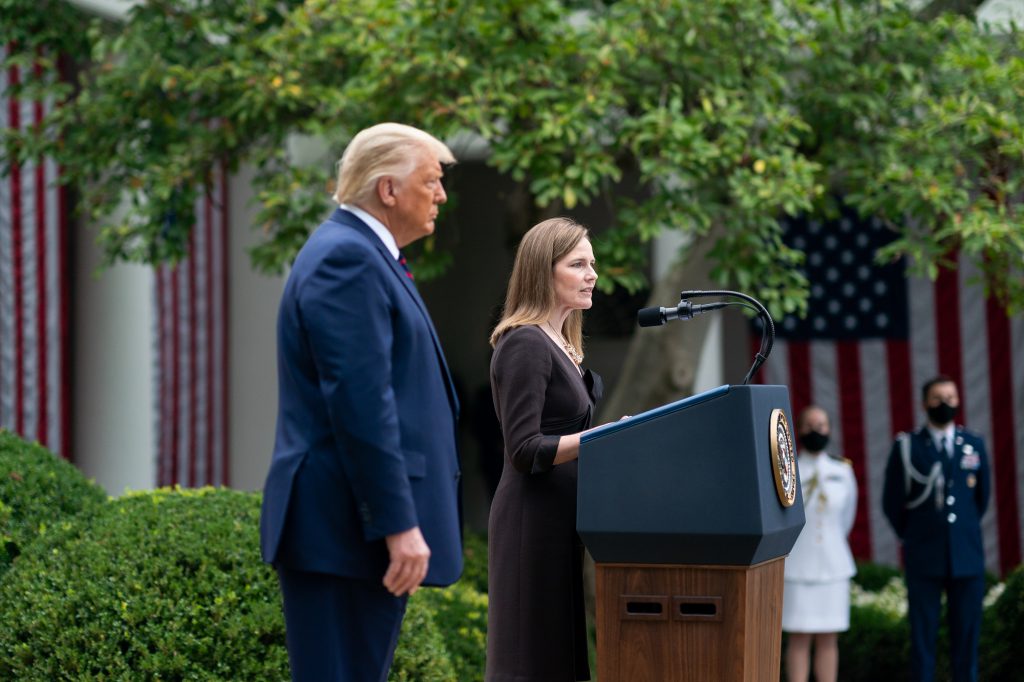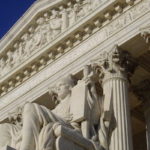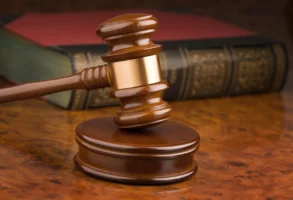
Published September 30, 2020
National Review - October 19, 2020 issue
This article appears in the October 19, 2020 issue of National Review.
“His judicial philosophy is mine too,” declared Amy Coney Barrett of her beloved mentor Antonin Scalia, at the White House ceremony for her nomination to the Supreme Court. Judge Barrett packed a lot of meaning into those few words. Her record, both as a judge and in her earlier career as a distinguished law professor at Notre Dame, shows both her profound commitment to Justice Scalia’s principles of textualism and originalism and her stellar ability to implement them.
As Barrett has explained, “textualism” and “originalism” are essentially two names for the same methodology, one arising in the field of statutory interpretation, the other in constitutional decision-making. The Constitution and statutes are legal texts, and the duty of the judge is to interpret their provisions according to the meaning they bore at the time they were adopted. Rival theories such as purposivism, pragmatism, and living-constitutionalism empower judges to ignore and override legal texts in order to impose their own solutions to the problems of the age.
“Judges are not policymakers,” Barrett explained in her White House remarks, “and they must be resolute in setting aside any policy views they might hold.” Judges have an obligation not to read their own personal convictions into legal texts, she has consistently emphasized, and that obligation is the same whether those convictions derive from their religious beliefs or from any other source.
Textualism and originalism deal with how people actually use language. Barrett has condemned as a canard the widespread view that textualism is literalism. As she notes, Scalia himself, for whom she worked as a Supreme Court law clerk, emphasized that “the good textualist is not a literalist.” Textualism and originalism do not allow legal texts to be read, as Justice Alito memorably objected in a dissent last spring, “as if they were messages picked up by a powerful radio telescope from a distant and unknown civilization.”
Barrett’s textualist criticisms of Chief Justice Roberts mirror Scalia’s. Before she became a judge, Barrett faulted Roberts for his 2012 ruling upholding Obamacare’s individual mandate as a tax rather than as a penalty. In so doing, he “pushed the Affordable Care Act beyond its plausible meaning.” Citing several other of his opinions and votes, she objected more broadly that the chief justice “has not proven himself to be a textualist.” (Her critique has little bearing on the current challenge to the ACA, and, contrary to Democratic rhetoric, there is ample reason to believe that conservative justices will reject that challenge.)
Although you wouldn’t know it from immediate distortions of her position, Barrett also shares Scalia’s embrace of the Court’s long-standing principle of stare decisis—adherence to precedent—on constitutional issues. Under that approach, erroneous precedent is not sacrosanct, but neither should it be overturned simply because it’s wrong. In a lengthy law-review article, Barrett defends the Court’s approach on the ground that “it promotes doctrinal stability while still accommodating pluralism.” As she spells out, a majority’s decision to overrule precedent on a constitutional question requires it to “take account of reliance interests”—that is, the extent to which citizens or government actors have made decisions that rely on that precedent and would be costly to alter—and to explain “why its view is so compelling as to warrant reversal.” Among the justices, only Justice Thomas rejects the Court’s approach: He would overturn a precedent if it’s “demonstrably” erroneous.
Barrett’s clear position in support of conventional stare decisis doctrine somehow hasn’t stopped respected journalists from claiming that her position is akin to Justice Thomas’s and “extreme.” The obvious reason that Barrett’s critics are distorting her position on stare decisis is to stoke alarm over the prospect that she will be part of a majority that will overturn Roe v.Wade. I welcome that prospect and the ensuing restoration of policymaking on abortion to the democratic processes in the states, and I take considerable hope on this matter from Barrett’s embrace of Scalia’s judicial philosophy. But there is nothing in Barrett’s record that speaks specifically to her view of Roe, much less to whether it should be overturned.
In her three years on the Seventh Circuit, Barrett has taken part in three proceedings involving abortion. In two of the proceedings, she voted unsuccessfully to have the full court review panel rulings that invalidated Indiana laws regulating disposal of fetal remains and requiring parental notification, and the opinion she joined expressed doubts about a panel ruling that invalidated another Indiana law prohibiting abortions motivated solely by the race, sex, or disability of the fetus. (The Supreme Court, by a seven-justice majority, overturned the panel ruling on the fetal-remains issue. It sent the parental-notification question back to the Seventh Circuit for further consideration.) In her one panel ruling, she was part of a unanimous majority that applied Supreme Court precedent to allow Chicago to enforce its “bubble zone” ordinance against pro-life sidewalk counselors outside abortion clinics.
Perhaps Barrett’s most impressive opinion as an appellate judge—one that demonstrates her masterful application of originalism—is her dissent last year on an important Second Amendment question. Rickey I. Kanter pleaded guilty to one count of federal mail fraud for falsely representing that his company’s therapeutic shoe inserts were Medicare-approved and for billing Medicare on that basis. As a convicted felon, he was barred by federal law and Wisconsin law from possessing a firearm. When he argued that the Second Amendment did not allow those laws to be applied against him, the panel majority rejected his claim.
In her dissent, Barrett marshaled and analyzed extensive historical evidence to conclude that, while the Second Amendment allows legislatures to prohibit dangerous people from possessing guns, felons do not lose their right to possess firearms solely because of their status as felons. It’s one thing for the government to conclude categorically that those who have been convicted of violent felonies are dangerous. But it’s quite another to draw that conclusion regarding nonviolent felons (yes, even makers of therapeutic shoe inserts). Neither the federal government nor Wisconsin had shown support for that conclusion. Nor did they in any other way show that Kanter was likely to be dangerous with firearms. Therefore, the Second Amendment, Barrett concluded, did not allow their laws to be applied against him.
The Obama administration’s threat to withhold federal funding from colleges if they did not take more severe measures against students accused of sexual misconduct provided the backdrop for a ruling by Barrett that has earned widespread praise and been cited favorably by courts across the country. Her ruling allowed a Purdue University student who had been suspended for sexual violence to pursue his claim that Purdue, in determining his guilt, deprived him of adequate procedural protections and discriminated against him because he is male.
At Barrett’s confirmation hearing for the Seventh Circuit, Senator Dianne Feinstein infamously insinuated that Barrett’s ardent Catholic faith would prevent her from being an impartial judge: “The dogma lives loudly within you.” But critics of Barrett cannot point to anything in her record that fairly supports that charge. Her opinions are powerfully reasoned and reflect principles of law, not faith.
Strangely enough, those who expressed concerns back in 2017 that Barrett could not separate her faith from her judging relied on an article from her days as a law student in which she (and her co-author, a law professor) argued that trial judges who are faithful to Catholic teaching can’t impose the death penalty and should therefore disqualify themselves from sitting on cases in which they might be required to do so. Removing oneself from ruling on a matter would be a curious way to try to make one’s religious beliefs triumph. Further, Barrett’s article opines that appellate judges affirming death sentences aren’t engaged in what Catholic moral theologians call illicit “formal cooperation” with evil (and that the inquiry into “material cooperation” is “exceedingly difficult”). It turns out that Barrett has sat on two death-penalty cases and ruled in both against blocking the execution, so concerns that she would recuse herself or rule on the basis of Catholic teaching on the death penalty are unwarranted.
As providence might have it, President Trump announced his nomination of Barrett to the Supreme Court on the anniversary of Scalia’s joining the Court in 1986. If all goes smoothly, she will take her own seat on the Court before the end of October. In doing so, Barrett will help extend and entrench Scalia’s great legacy for decades to come.
Ed Whelan is the president of the Ethics and Public Policy Center and a regular contributor to NRO’s Bench Memos blog.












